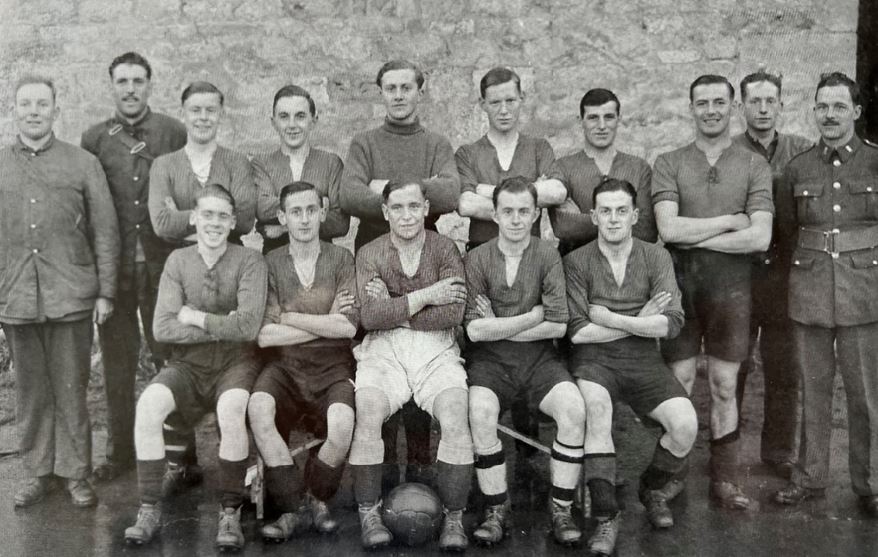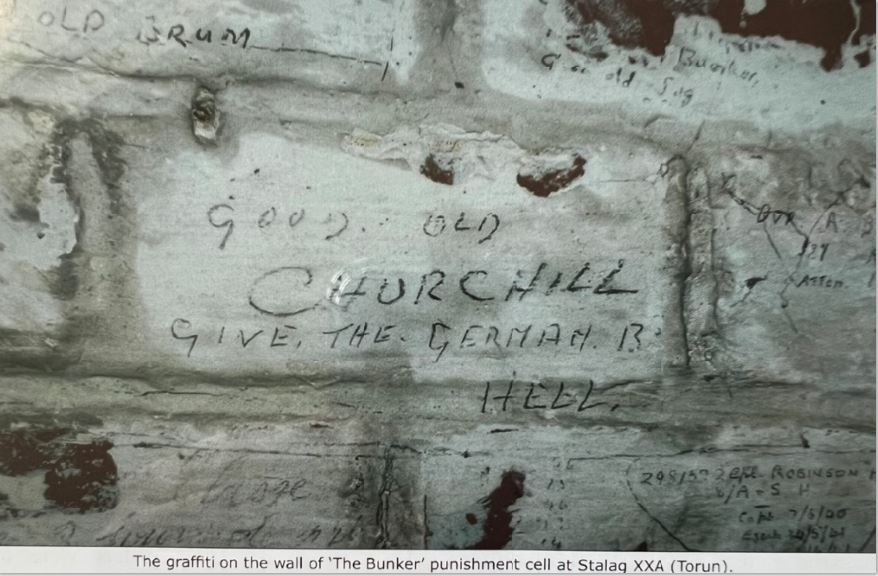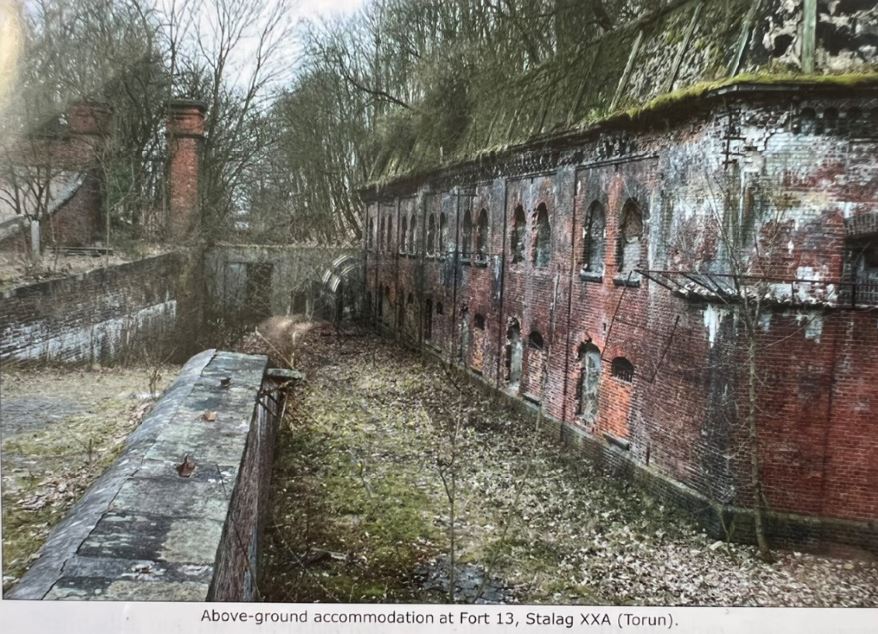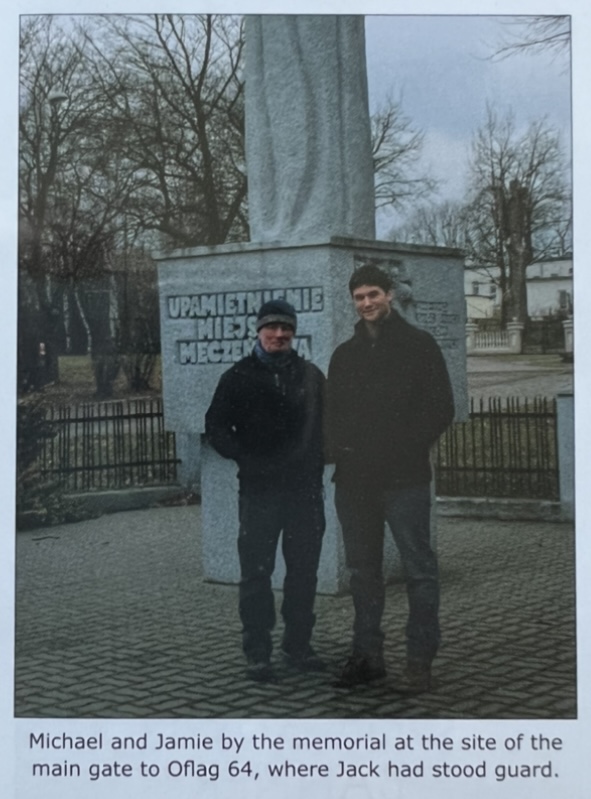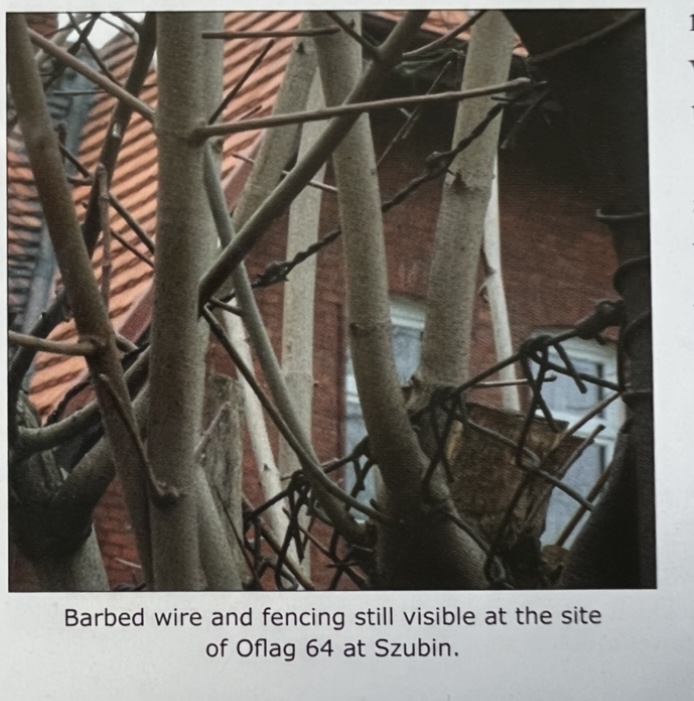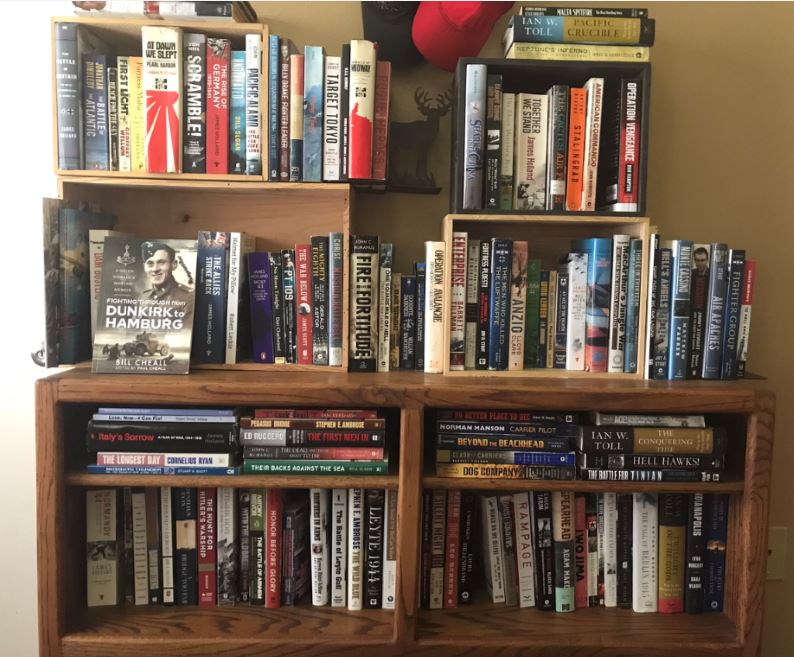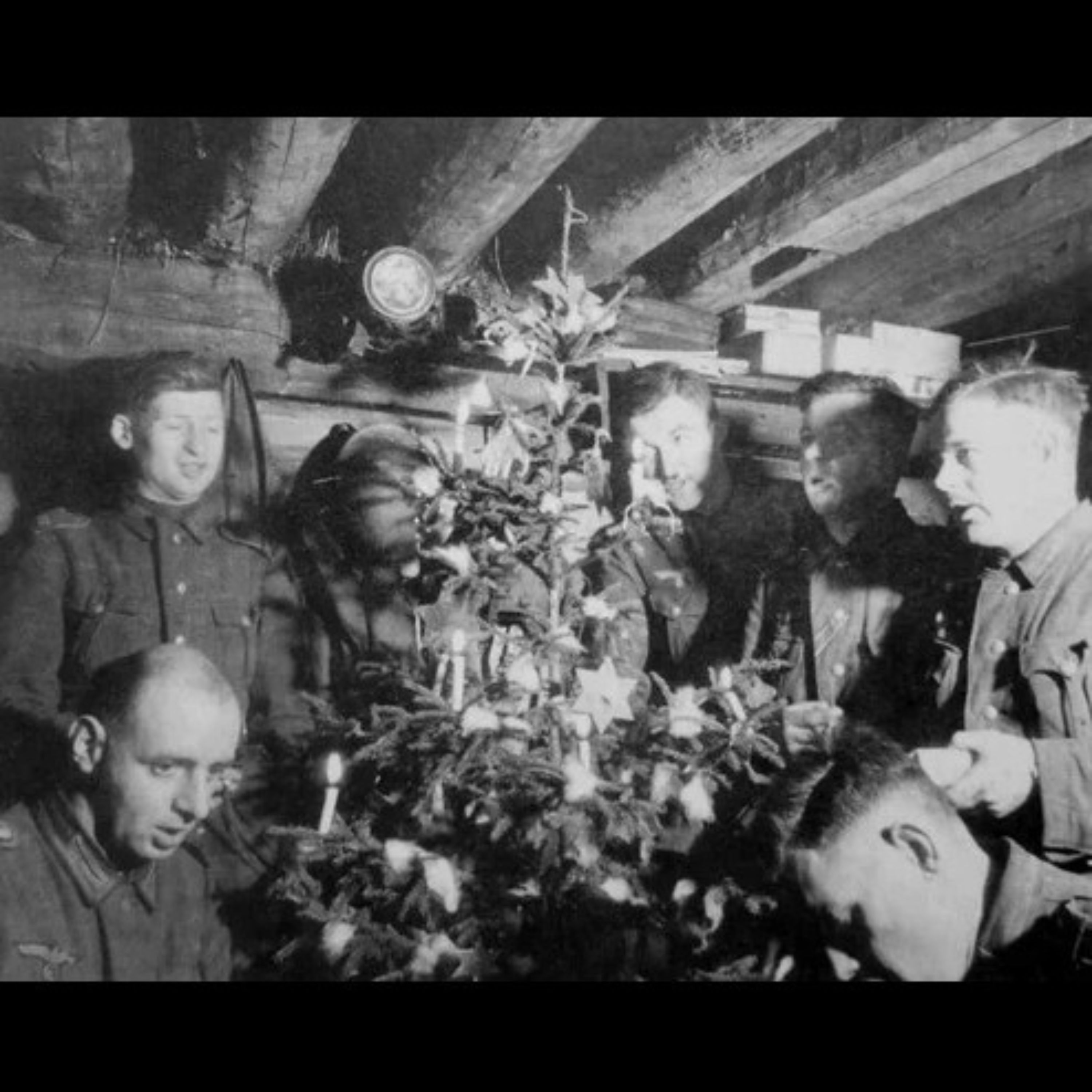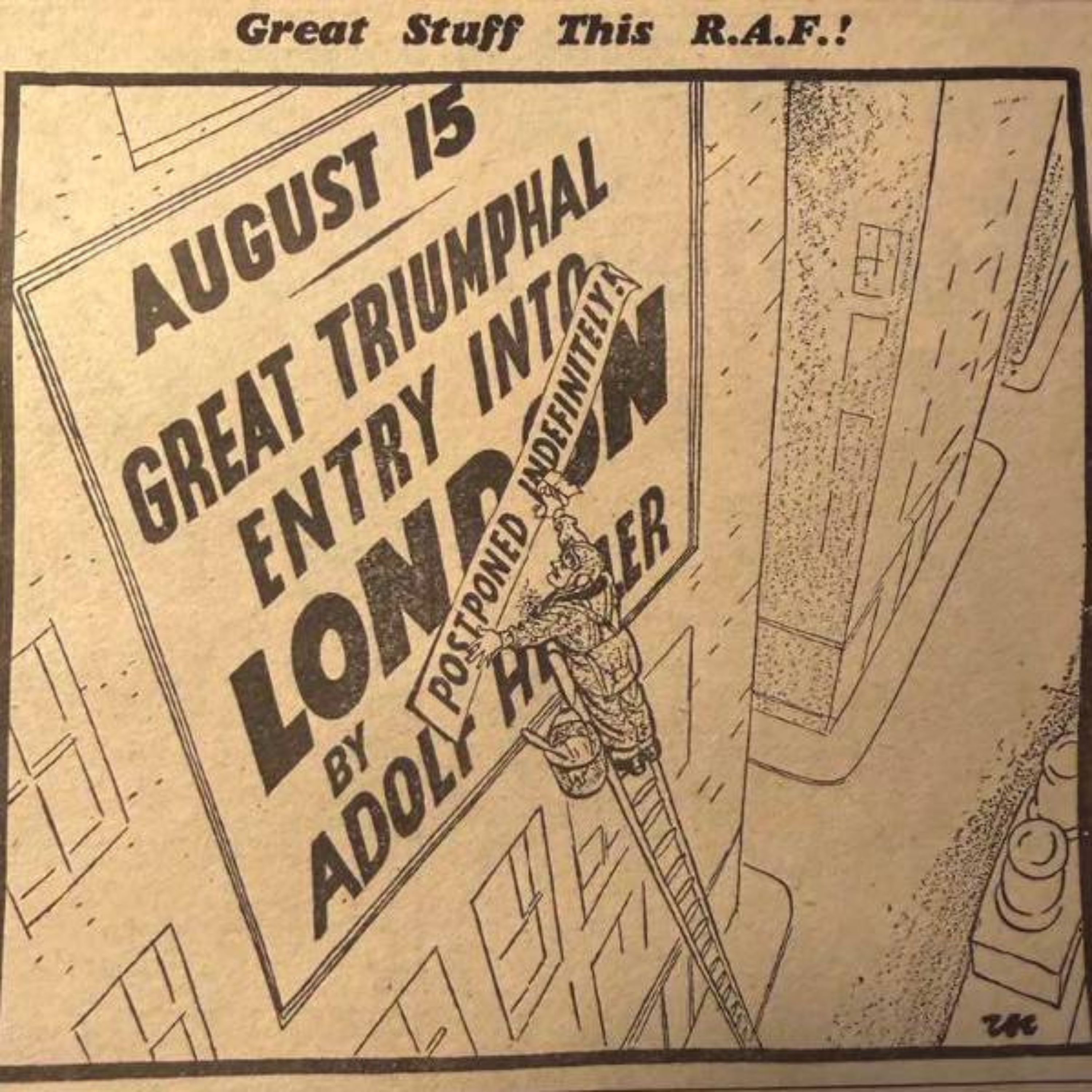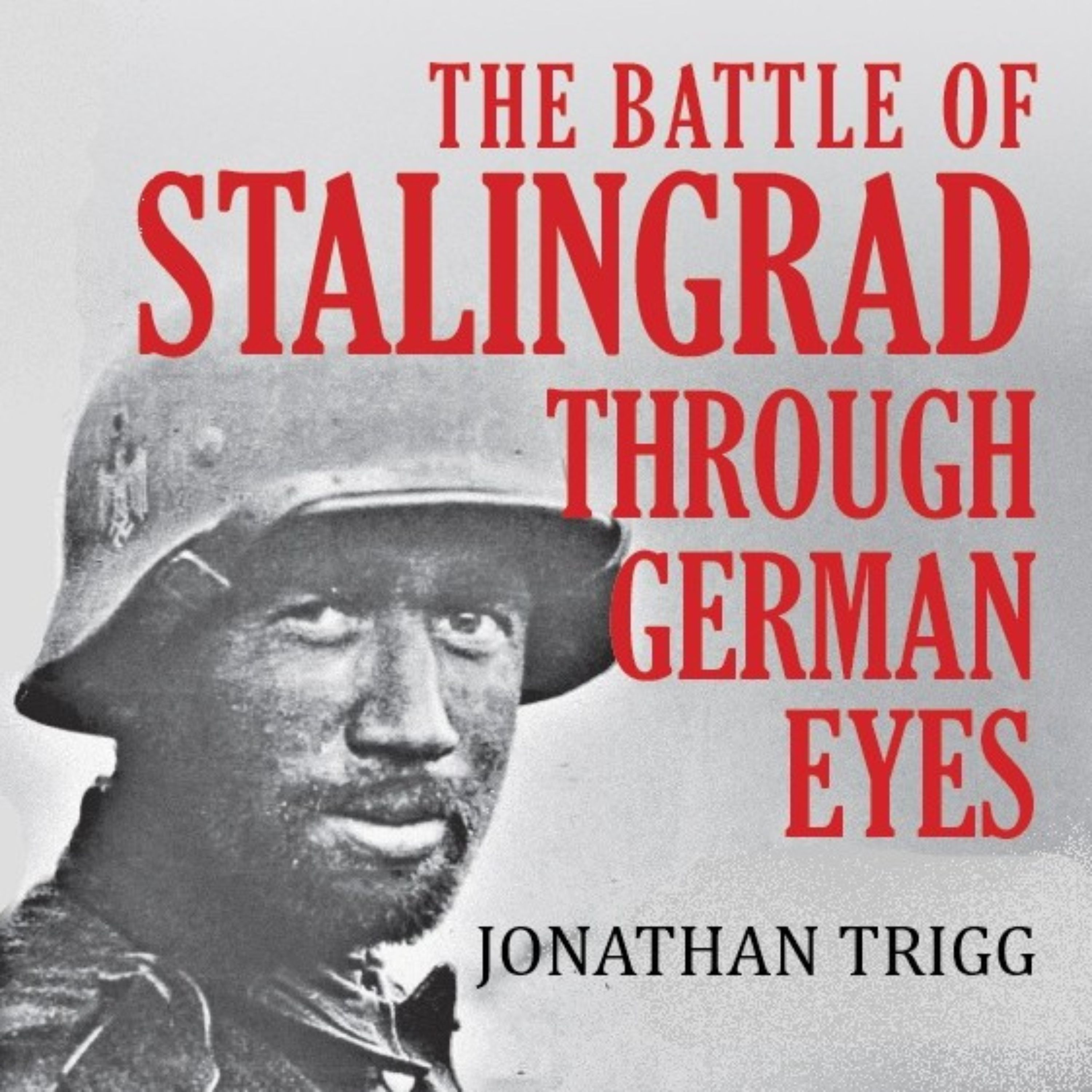73 Jack Stansfield POW in WW2
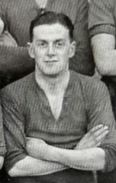
5th Green Howards POW story, Poland
An article written by Michael and Jamie Stansfield, the son and grandson of Jack Stansfield.
Jack Stansfield was a Green Howard, same as Dad, except Jack was in the 5th Battalion and Dad was in the 6th.
Full show notes at:
https://www.fightingthroughpodcast.co.uk/73 Jack Stansfield POW in WW2
Reviews on main website
https://www.fightingthroughpodcast.co.uk/reviews/new/
Apple reviews - https://itunes.apple.com/gb/podcast/ww2-fighting-through-from-dunkirk-to-hamburg-war-diary/id624581457?mt=2
Follow me on Twitter - https://twitter.com/PaulCheall
Follow me on Facebook - https://www.facebook.com/FightingThroughPodcast
YouTube channel - Loads of my own videos - Dunkirk Mole, Gold Beach, much more. https://www.youtube.com/user/paulcheall/videos
Interested in Bill Cheall's book? Link here for more information.
Fighting Through from Dunkirk to Hamburg, hardback, paperback and Kindle etc.
Intro Passage 1
One winter's evening about 2 years before his death my Father Jack Stansfield was sitting at home in front of a coal fire and without any apparent reason started to talk calmly about his life as a prisoner of war during World War II. I was shocked.
Intro Passage 2
The group of about a dozen prisoners working on the farm were locked in a van each night. The local Polish blacksmith who had been ordered to install iron bars on the Windows managed to do so in such a way that they could be easily removed which meant the boys could escape to forage for food
Intro Passage 3
We marched into the town behind the Union flag and got a great reception from the senior Russian officer who insisted that we be giving the best billets for the night.
Intro Passage 4
An American soldier with a serious gun shot wound on the side of his head came into the camp hospital. He was from Texas. The Doctor told me he did not think the American Sgt. would live the night out.
D Company 5th Green Howards 1939 - Jack Stansfield front far right.
POW graffiti on wall at Stalag XXA
POW accommodation Stalag XXA WWII
POW Farm work party incl Jack Stansfield and Tom Marquis
Michael and Jamie Stansfield at main gate to Oflag 64
Barbed wire still visible today
Green Howards - History in Photographs
Bookshelf of WW2 books - Todd Kehoe
Welcome
I’m Paul Cheall, son of Bill Cheall whose WWII memoirs have been published by Pen and Sword – in FTFDTH.
The aim of this podcast is to give you the stories behind the story. You’ll hear memoirs, and interviews with veterans in all the countries and all the forces. I dare you to listen!
This episode
A great story of Jack Stansfield as a POW in Poland. Jack was with the Green Howards, same battalion as Dad, and was captured by the Germans during the Dunkirk campaign in 1940, a fate which Dad avoided by the skin of his teeth, as we’ll find out later. Also we’ve got a few family histories to share.
News Stan Perry
Firstly, I’ve got some sad news to share with you.
6 Oct 21 marked the passing of tank Capt Stanley Perry. Stan served with the Sherwood Rangers as a tank commander and fought his way across NW Europe, being wounded twice.
I was lucky enough to interview Stan a couple of years ago. And you can hear his memories in episodes 36/37 - Captain Stan Perry.
Stan regaled us with no end of jaw dropping as well as funny tales of his time in Normandy 1944 with the Sherwood Rangers and I don’t think I’ve ever heard quite so many scary stories in one go. And I know I’ve never met anyone carrying more injuries and shrapnel in his body! I’m now going to replay a few extracts from his interview with me.
There you go, if you want to catch up with all Stan’s exploits, listen to episodes 36 and 37 of the FTP.
Stan Perry, the last troop commander of the Sherwood Rangers. RIP Stan - You will be missed by all.
Feedback/F History 1 - Peter Douglas Cray Creagh from Australia
I discovered your podcasts earlier this year and I have been listening to the episodes on the bus to and from work. Occasionally, I'll listen when I am on the rack at the gym.
Like many Boomers (of which I just qualify) across the Commonwealth, I grew up in the shadow of the two world wars legacies. I have childhood memories of Airfix plastic models, Commando and Battle comics along with the annual attendance at the ANZAC Day parade. [I used to get the Hotspur and the Victor comics at various times and even today I’ve still got a good number of them in my loft, hand bound into like an annual – I can’t believe it but we hang onto these mementos don’t we? Every now and again I get one of those commando comics to read too. They always have a full colour picture on the front and I’ve started to pick up ones which cover my favourite parts of the war like Dunkirk and D-Day]
Two years ago I revisited the war memorial in Blackall in Central Queensland. The name 'A. Douglas' was inscribed on the southern side of the plinth. I was a little perplexed as I never noticed the name on previous visits to the town nor had it been pointed out by my mother's family.
As a boy, I had an insatiable interest in 'warrie' stuff, especially the Japanese mountain gun in the memorial park. There is a family history of Gallipoli, the Light Horse, Spitfires and Beaufort bombers on my father's side. Very little from my mother's side other than a little of my grandfather's WW2 service that included two weeks detention for going AWOL so he could attend my uncle's birth, to which the said uncle was late.
Old Joffre (nicknamed after the French general) had been a biscuit bomber crewman. I didn't appreciate that role until one day he mentioned 'seeing the men fighting on the ground' (literally he summed up his wartime service with those scant words).
I assume this sight would have been the muzzle flashes in the jungle and if he could see them, the Japanese could see his plane. I am not sure whom he hated more, the Japanese or the officers as both were bastards in his eyes. The latter was still hard felt as he didn't attend my brother's graduation from Royal Military College at Duntroon in 1984. Mind you, he was very proud to be photographed alongside of him as a young Major when my brother gave the ANZAC DAY address in Blackall some years later.
Back to 'A. Douglas' on the war memorial. I asked my mother about the name and she told me Arthur was my great grandfather's brother and he had run away from home as a teenager. He had grown tired of his strict father and the floggings. Mum told me, according to Gran, that Arthur had been a Lewis machine gunner. Not much more to be said, a reflection of the family's stoicism, ignore the pain and it will fade away.
I have since learned Arthur was a member of the 52 Battalion, 1st AIF and he was killed in action during the Battle of Villiers Bretenoux. Maybe, had I known he was a gunner, I might have been more keen to carry one as a young digger but the machine guns are heavy and a mongrel of a thing to haul around an obstacle course.
During the short Brisbane covid lockdown
and following the 10 kilometre local exercise directive,
I took to walking the dogs in the Toowong Cemetery. There are many Commonwealth War Commission headstones in the cemetery. Most of these are the broken and ruined blokes who died young. Profoundly sad reminders of those who grew older but not that old. I have gleaned some basic information from the records. You can tie some of the men to the actions of Arthur's battalion on 24 April 2018.
One, a gunshot wound to the lower jaw and another, a shrapnel wound to the face resulting in an eye excision. Ernest Junger wrote about the terrible nature of a jaw wound in his book Storm of Steel. Dreadful stuff.
No family member has ever visited Arthur's grave and I intend to be the first when my wife and I travel to the UK in the future. I'll take some red earth from Kuungari country and place it on his plot.
I know you have received many comments about the strangeness of 'enjoying' the pod casts. Well, I do enjoy and appreciate the stories of the men who could be those unnamed faces in wartime photography and film.
Kudos to you for keeping your Dad's and his generation's legacy alive.
Kind Regards,
Peter Douglas Creagh
- Mate, a bit of strine pronunciation. Brisbin, Mellbin, Canbrah :)
Ah - says me - so it’s not Brisbain Melbourne and Canberra?!
And, ignore my sledge about pronunciation. I do not recall which British actor made the claim but he said that one can only master the Australian accent by speaking as if your mouth is full of barbed wire.
It works
Thanks Peter.
Buy me a coffee 1 Greg Guiffri
Patreon - Greg Guiffri
Buy me a coffee 2
Jamie Beale
Glastonbury UK
Hi Paul, I just finished episode 72 and just wanted to say the show is ageing like a fine wine, just excellent. The Christmas episode last year, 2020, was very moving (especially the German choir as mentioned in your dad's book) so the bar is now set high Mr Cheall.
Thanks Jamie and you’ve prompted me to remind everyone about sending in any Christmas at war stories– I’m curating a nice number already but none as yet from a listener. Apart from a lovely story and much more, sent in by American Rainy Horvath about her pilot father who flew military transport over the Himalayan mountains on the so-called China-Burma-India route. That’ll be coming soon to a podcast near you.
Which podcast is that, Paul?
The Fighting Through Podcast of course!
And oh, I’ve got a bonus reading from Heidi Langbein-Allen’s memoir about her German father Willi as a boy soldier – hear how he spent one Christmas.
Survey Comments
Greg Parfitt – keep up the good work, it ain't broke so don't fix it. Thanks Greg – I think evolution rather than revolution is the watchword based on that comment. WW2 Podcast.
Feedback 2 George Guiver on the Seabees
Wonderful episode. Sometimes these Seabees are forgotten for how much they contributed to the Allied victory. I was anxious to see his paintings and drawings. Did not disappoint.
George Guiver on Facebook
Family stories 1 – Todd Kehoe USA
Todd is totally enjoying the American Ranger series atm, PFC Morris Prince – ep 56 Omaha
He said “My grandfather was PFC Franklyn McCaffrey - He was certified as a sharpshooter with an M1 in the infantry. And he fought on Omaha in Normandy for nine days before he got wounded via an MG-42 – had a leg wound the rest of his life.
Todd sent me a photo of his overloaded bookshelf, which displayed a copy of Dad’s book. Todd added:
You know you’re afflicted (As Al Murray would say) when your Second World War bookshelf is in chronological order covering firstly memoirs & then strategic/tactical books. I would highly recommend the Ian W. Toll trilogy on the Pacific campaign.
Todd, thanks for getting in touch.
War stuff 1 The King’s Choice
I’ve just been watching a very suspenseful and educational drama based on Norway’s Involvement in the Second World War. All about the choices faced by the king and democratic government of Norway following the invasion of the country by Germany under the pretence of protecting them against British invasion!
It’s a new production, I understand, and it’s available through BBC Four, hopefully on a TV channel near you.
And I noticed in the credits what I thought was quite an evocative dedication and message for today’s generation.
For our children-and for you, the generation about to take over.
Understand, remember and pass it all on.
War stuff 2 Point du Hoc Michael Stapleton
Hi Paul doing a bit of research on Normandy for my trip next year and I’ve come across a German position I’ve never even heard of, it’s just off of Pointe Du Hoc, called Maisy it seems the Germans let the allies know all about the pointe but this position you can literally see the pointe from, but it wasn’t actually attacked until the 9th June so for 3 days it was basically left alone to bomb and harass the landing of troops - but it’s not been reported on history reports only an after action report from when the rangers advanced on the 9th.. might be something you can shine a bit of light on?
Michael Stapleton
Anyone got any more info on the Maisy defence position near Pointe du Hoc?
War stuff 3 – James Holland interview
BBC History extra 6 Oct
“Courage under fire”
Interview with James
And if anyone wants a real insight into the terrifying war fought by the likes of the late Stan Perry in the Sherwood rangers you should listen to this. The odds were not good at all for the tankers. Seriously great history!
Main event
Back story Jack Stansfield
I’ve mentioned several of Dad’s missing comrades in previous episodes, some of whom were captured at Dunkirk and I’ve always wondered what happened to them.
This is the backdrop from Dad’s book regarding these comrades and it involves the fighting at Gravelines, not far from Dunkirk in May 1940.
“During the early hours of the next morning, we were defending a bridge at
Gravelines when four tanks approached us from the direction of Calais and we fired
upon them causing them to withdraw out of sight. Very soon afterwards, the same
tanks came towards us yet again, but this time flying red white and blue streamers
and they turned out to be British tanks which had been cut off during a tank battle
outside of Calais – they immediately joined us in the defence of Gravelines.
We lost some good boys here because apart from the bombing by the Stukas,
we were being shelled by the 88mm guns. The enemy infantry tried yet again to
attack us, causing casualties to both sides and, not realizing how near we were to the
enemy, some of our other ranks were taken prisoner, as were Captain Kidd, Captain
Foster and Second Lieutenant Farrand, the latter being already wounded. All the
inhabitants must either have fled or were hiding in cellars because we didn’t see a
single civilian.
Considering our strength, we had put up a good show against a very forceful
enemy who knew that he had the upper hand and that it was only a matter of time
before their victory was assured.
For the action we fought at Gravelines, several officers received decorations
and we were mentioned by name in the despatches of Lord Gort.
I have had no more insight as to the fate of Dad’s captured comrades, UNTIL recently when I came across an article in The Green Howard magazine which I subscribe to as a fellow of the Green Howard museum. The article is called In Jack’s Footsteps and was written by Michael and Jamie Stansfield, the son and grandson of Jack Stansfield and describes them tracing Jack’s POW record and the history behind it. It includes diary entries that Jack made at the time. I think it’s likely that Captain Kidd, Captain
Foster and Second Lieutenant Farrand, would have followed the same route as Jack did because …
Jack Stansfield was a Green Howard, same as Dad, except Jack was in the 5th Battalion and Dad was in the 6th. They had similar experiences during the fighting albeit they were in different areas. I’d like to cover a bit of the story which precedes the article, to paint the picture of the lead up. So the following comes from Capt WAT Synge ….
Round up
And that is pretty much it.
What a brilliant story. And once again we've heard how the Polish people came up trumps in doing their best to look after their reluctant visitors. I'll say thank you very much to Michael Stansfield and son Jamie for doing such a brilliant job in stitching together the history and combining it with both Jack’s diary and their own visit.
It must have been quite a tricky job so many thanks guys for doing all that. I can imagine it took absolutely ages. A posthumous thanks to Corporal Jack Stansfield for his service and efforts to record his POW experience. I wonder if you met or knew of Dad’s captured comrades because I can’t help wondering if their paths crossed at some point in Poland. At least Jack’s story gives me a huge insight into what became of them.
And for all that I hereby present Stansfield family this month's how good is that award.
And thanks to the Green Howards magazine also. I'll remind you that there are various photographs in the show notes together with an advert for a super book about the Green Howards - a History in Photographs by Roger Chapman. If you want to get your hands on a quality piece of photographic history about the Green Howards then this is your book.
Thank you so very much for your support and for making the time to listen to me.
Please do hear me next time.
I’m now going out on a very short medley of Stan Perry’s favourite moments.
After that there’s a PS about
another British POW experience in Germany.
I’m Paul Cheall …
PS
Escape to Captivity
by peter orchard
POW Germany
Army
Contributed on:
15 November 2003
Army service of Peter Orchard. WO. REME. Royal Electrical & Mechanical Engineers – later Capt
After active service in Palestine emergency 1936 -39, I was in Malta until 1942, when I was posted to the 8th. Army in the western Desert, and after skirmishes with Rommel we moved to Tobruk.
The Army was besieged in Tobruk. And We surrendered into the hands of the Germans. They ordered us to proceed to the POW compound, some 5 miles away. The Germans said we could walk there or go in our own trucks which we had not had time to destroy. We said OK, having made holes in the sumps of the trucks; they just got us there before the engines seized up solid!
The next POW camp at Benghazi was under control of the Italians , water was a problem , they produced it in 44 gallon drums that had been used for diesel fuel and had not been properly cleaned out. Result - massive diarrhoea in some 2000 prisoners.
We were soon taken by boat to Italy, first in Brindizie southern Italy. Then to a camp north of Rome near Ankona. Italy capitulated; Mussolini was killed and the guards smashed their rifles against the nearest post, tore off their uniforms and shouted `the war is finished I am going home to `multi Vino, multi pasta, and multi `Nikki-nick!`.
A company of Germans soon arrived and we were on a train through the Brenna Pass to Germany to Stalag “V. POW camp, that was a former concentration Camp for the Jews. We had to strip and tie our cloths in a bundle or bag if we had one, these were put in the Cyanide gas chamber, and we went naked into the showers. Our cloths came out stinking of the cyanide Gas, we had to shake them for some minutes before dressing.
My weight had dropped to 7 stone; at last the Red Cross Parcels arrived to supplement our POW food of a couple of slices of black rye bread, potatoes and turnips, with occasional goat meat in the daily stew. The potatoes were boiled in their skins, we took it in turns to have the skins to make a `biscuit` baked on the top of fire stove each hut had for heating.
A corporal of the Australian Army Tom Ward was captured with the resistance in North Italy and was being taken to Berlin for trial as a spy, which meant the death penalty. He was kept in the `cooler` outside of the main camp and was to be bathed and de-loused in the camp’s big Shower Block (where we had a monthly shower), before going to Berlin.
The key to the gate from the camp to the showers was trusted to a Sgt. Of the South African Army, who spoke German. He locked up at night, handed the key to the guard house, and drew it the next day for prisoners assembled from each hut in turn to shower. The Camp held more than 10,000 prisoners of all nationalities! So the shower house was very large and in constant daily use.
On the day Tom was to be showered and deloused the key was not issued by the Germans, BUT the escape committee knew this in advance. So the night before it was arranged that the padlock only looked secured before the key was handed in.
All was set for the escape INTO the POW camp proper.
The POW camp was for senior Non Commissioned Officers, Sergeants and Warrant Officers. So there were some good brains at work on the escape committee
In the morning set for Tom Ward’s delousing and shower, he stripped naked and put his clothes in the Gas chamber, now he was the only person in the very large shower room, with the guards on the far side of the shower room. Outside the gate from the main camp was a rigged party of prisoners supposedly ready to take a shower. The pad-lock was unhitched and into shower room rushed naked prisoners from the main camp. The guards were taken by surprise and shouted `rouse rouse `-get out -they did but with Tom Ward, who was quickly dressed with battle dress supplied by the escape committee; now they were all, including Tom, back in the main camp. The Germans were livid when they realised what had happened, and all hell was let loose!.
Page 2
It did not take long for a company of SS to arrive ordering the whole camp out for an inspection count and identification of all Prisoners. Tom Ward was in our hut---the question was where to hide him. Above the ceiling the slanting roof had sacks of straw in the gap between the outside walls the ceiling and sloping roof, Tom got inside one of these. The whole camp was kept outside for some 16 hrs and we were checked against the records kept by the Germans.
The search included guards from the SS going up above the ceilings and bayoneting the sacks. By the time they got to our hut, which was about the last, they were obviously getting tired, and the bayoneting missed Tom Ward!
This was not to be the end of the searching, we learnt that notices were put up in the surrounding village, offering a reward for his capture, They just did not know where he was and were determined to get him. Two weeks later a Battalion of SS arrived in armoured Cars, we were ordered out for further checks and the SS. took the place apart. This time we knew they were deadly serious, so Tom Ward got down inside the night latrine, a sewage pit, and stood in the sewage for hours--just ghastly, I just don’t know how he stuck it, He got through it with terrible uric acid burns, which took weeks to heal. He finally took over identification of a South African Sergeant who had hung himself. The Prisoner records were kept in the German main office by POWs working as clerks, they arranged the switch, even Tom Wards fingerprints!
Tom Ward passed subsequent German identity checks, they never twigged it. He remained in the camp until we were freed by the Russian advance.
In January 1944 I had the misfortune of contracting Cerebral-spinal Meningitis. They had to put me in a straight jacket , because the pressure on the nervous system caused me to thrash about uncontrollably. In the hospital I was treated by a French POW doctor.
That night a Red Cross supply of drugs came in from Switzerland, the Doctor said he very nearly did not give me the Sulphonamide drug that eventual cured me because he thought I was `too far gone to save`.
I recovered enough for a German medical board who recommended me for POW exchange category `B`, an exchange that never took place;. In any case I did make a slow recovery during the next 15 months, up to the time the Russian advance caused the Germans to abandon our POW camp.
While recuperating in the hospital an American soldier with a serious gun shot wound on the side of his head came into the camp hospital. He was from Texas USA and the Doctor could not understand what he said, so I found myself interpreting broad Texan accent into English!
That night before another consignment of Red Cross Drugs came in the Doctor told me he did not think the American Sgt. would live the night out. Early next morning the excited Doctor took me to see the American sitting up smiling. `Its almost a miracle` said Doctor, I just gave him three shots of Penicillin a new drug just out and look at him now! He fully recovered and came back into the main camp with me.
I learnt some years later the discovery was worked on by Mrs.Suzian Tritton
M.P.S.,F.R.I.C. my very good friend and wine making mentor who was an assistant to
Dr.Flemming who made Penicillin, but more about her later.
Stalag lV was an ex concentration camp. On the exercise field to the north there was a series of humps, our senior representative a W.O.1 asked the Germans if we could flatten it to make a playing field for games. This was firmly refused by the commandant. It was later learnt the field was a burial ground. The humps were the top of a series of limepit trenches where it was said were the bodies of Jews who died in a collier epidemic, when the camp was a Jewish concentration Camp.
Two years after the British arrived in the camp a reading of the Camps Electric meter showed a 1000% increase in electric consumption! A big raid took place to find out why?.
Page 3.
This led to tables between the British Sector Huts full of confiscated equipment of all kinds. from electric fires in the RAF Huts, to numerous Brew kettles to make Tea and coffee from Red Cross Parcels. These were mainly two metal plates, separated by a piece of wood, placed in a brew can, the wires were connected to nails and another piece of wood for a plug. When plugged in the whole thing was alive and very lethal if touched. We had striped the wiring from the outside lavatories that were disconnected anyhow, we wired the mains up to secret sockets behind two tiny holes in the wooded walls of the hut.
One thing the Germans never did find was the Radio set in our hut. Its was under the seat of a stool our hut commander would sit on as he was allowed to stay in the hut, when a search took place. We had a large home made Map of the War zone, and pined up little flags to show the Allies &Russian advance from the news we got. The German Sgt. Major would come to find out the war situation . He would say `no no that’s not correct`, knowing full well it would come on the German news sometimes a week later. He was comparatively friendly and we would have a laugh at his expense. In the end he would come in almost every Day.
The Camps News letter was also compiled from news we got from our Radio Which was made from bits and pieces bought from guards with cigarettes and some times coffee from Red Cross Parcels. The bulk of these parcels came from Canada, mainly because the Canadian Red cross would escort the parcels and cigarettes to Germany. From UK Some 60% of the parcels, especially cigarettes were pillaged first in the UK ports, then across Spain Switzerland and of course Germany. I only got some 15% of the cigarettes Dad & Mum sent me. The distribution depended on how many parcels were available, at the very best it was one food parcels between two of us, They were only available about half the time.
The end of the War in Europe for us in the POW camp came with the advance of the Russians in 1945. The Germans were fleeing to the other side of the River Elbe, and wanted us to join them. Our `Man of confidence refused the German offer to take us (some 10,000. Of us) across to the Other side of the River Elbe.
The Russian liberation consisted of an Officer on horse back , riding into the Russian compound. `You are liberated in the great name of the USSR` he then said those who are fit can draw a rifle from the horse drawn trucks, and join the front. A prisoner shouted that man is a German dressed as a prisoner; the office drew his pistol and shot him dead on the spot.
He continued `The rest are at liberty to go (walk!) home, We did later find some dead on the road side in their attempt to go home to Russia (the Russians sector was quite separate from the European sector of the POW camp, Because they were not protected my the Geneva convention; in fact the Germans starved very many of them to death. They had to pull carts with tanks on them, used to empty the sewage from the night latrines at the end of each hut, they also had to pump this sewage out on their rounds of the camp, using hand pumps. The sewage was taken to the fields to fertilise the turnips etc.used to feed POWs!. Russian officers said soldiers were expendable.
The Camp was liberated on the 14 April 1945. My friend Eric Skinner D.F.C.,a WO.1 air gunner of the RAF he and I went walk about to the near by villages where we `liberated two bikes!` the houses were mostly empty , just a few very old people who had been left behind the fleeing population. We entered a Villa that had been pillaged by Russian Soldiers, they had just used their rifle butts, smashing lovely furniture in wanton destruction.
End










